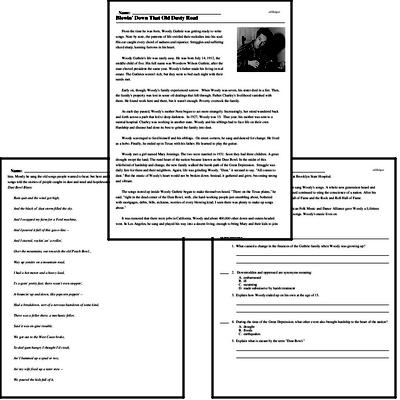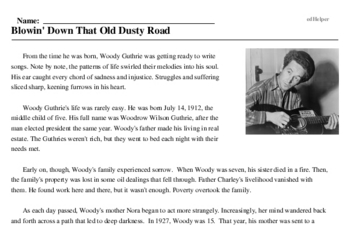Blowin' Down That Old Dusty Road
Woody Guthrie
Reading Comprehension for July 14
From the time he was born, Woody Guthrie was getting ready to write songs. Note by note, the patterns of life swirled their melodies into his soul. His ear caught every chord of sadness and injustice. Struggles and suffering sliced sharp, keening furrows in his heart.
Woody Guthrie's life was rarely easy. He was born July 14, 1912, the middle child of five. His full name was Woodrow Wilson Guthrie, after the man elected president the same year. Woody's father made his living in real estate. The Guthries weren't rich, but they went to bed each night with their needs met.
Early on, though, Woody's family experienced sorrow. When Woody was seven, his sister died in a fire. Then, the family's property was lost in some oil dealings that fell through. Father Charley's livelihood vanished with them. He found work here and there, but it wasn't enough. Poverty overtook the family.
As each day passed, Woody's mother Nora began to act more strangely. Increasingly, her mind wandered back and forth across a path that led to deep darkness. In 1927, Woody was 15. That year, his mother was sent to a mental hospital. Charley was working in another state. Woody and his siblings had to face life on their own. Hardship and disease had done its best to grind the family into dust.
Woody scavenged to feed himself and his siblings. On street corners, he sang and danced for change. He lived as a hobo. Finally, he ended up in Texas with his father. He learned to play the guitar.
Woody met a girl named Mary Jennings. The two were married in 1931. Soon they had three children. A great drought swept the land. The rural heart of the nation became known as the Dust Bowl. In the midst of this whirlwind of hardship and change, the new family walked the harsh path of the Great Depression. Struggle was daily fare for them and their neighbors. Again, life was grinding Woody. "Dust," it seemed to say. "All comes to dust." But the music of Woody's heart would not be broken down. Instead, it gathered and grew, becoming strong and vibrant.
The songs stored up inside Woody Guthrie began to make themselves heard. "There on the Texas plains," he said, "right in the dead center of the Dust Bowl, with...the hard-working people just stumbling about, bothered with mortgages, debts, bills, sickness, worries of every blowing kind, I seen there was plenty to make up songs about."
It was rumored that there were jobs in California. Woody and about 400,000 other down-and-outers headed west. In Los Angeles, he sang and played his way into a decent living, enough to bring Mary and their kids to join him. Mostly he sang the old songs people wanted to hear, but here and there he squeezed in one of his own. His songs told the stories of people caught in dust and need and hopelessness. Listen to the story in Woody's Talking Dust Bowl Blues:
Rain quit and the wind got high,
And the black ol' dust storm filled the sky.




